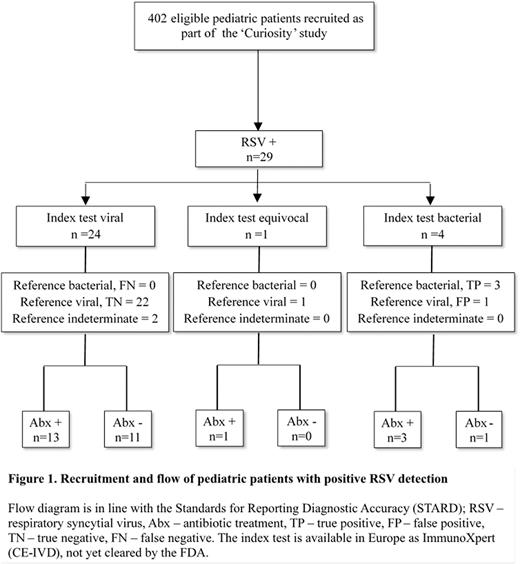-
PDF
- Split View
-
Views
-
Cite
Cite
Niv Mastboim, Kfir Oved, Tanya Gottlieb, Asi Cohen, Roy Navon, Meital Paz, Ellen Bamberger, Tom Friedman, Liat Etshtein, Olga Boico, Adi Klein, Isaac Srugo, Irina Chistyakov, Israel Potasman, Eran Eden, Liran Shani, 873. Using the Host Immune Response to Identify Viral-Bacterial Coinfection in Children With Respiratory Syncytial Virus Infection, Open Forum Infectious Diseases, Volume 5, Issue suppl_1, November 2018, Pages S25–S26, https://doi.org/10.1093/ofid/ofy209.057
Close - Share Icon Share
Abstract
A major challenge in the effective management of children with RSV infection is the clinical difficulty of distinguishing a simple viral from viral–bacterial coinfections. As a result, despite the low rates of viral–bacterial coinfection, RSV patients are often prescribed antibiotics with recent reports demonstrating more than 60% antibiotic overuse rates (Van Houten et al. 2018). Here, we examined whether a host-immune signature combining the viral-induced proteins TRAIL and IP-10 with the bacterial-induced protein CRP (ImmunoXpert; Oved et al. 2015) can distinguish simple viral from viral–bacterial coinfection in RSV patients.
We studied 402 febrile children enrolled as part of “Curiosity,” a prospective study designed to develop and validate the host-immune signature. Infection etiology—viral or viral-bacterial coinfection—was determined by a panel of experts following a review of patients’ clinical, laboratory, radiological, microbiological, and follow-up data. RSV strains were detected using a respiratory multiplex PCR applied to nasal swabs (Seeplex-RV15).
Out of the 402 children with suspected acute infection 29 had a positive RSV detection (Figure 1); of them, 27 had a unanimous expert panel etiology determination: 24 viral and 3 viral–bacterial coinfections. Out of the 24 patients unanimously assigned viral by the expert panel, 13 were given antibiotics, indicating a 54% antibiotic overuse rate. The host-immune signature correctly identified all 3 viral-bacterial coinfection cases, as well as 22 out of the 24 (92%) simple viral patients. This finding supports that the signature has the potential to reduce antibiotic overuse by 6.5-fold (from an overuse of 13/24 = 54% to 2/24 = 8%, P < 0.001).
Our results demonstrate high antibiotic overuse rates for RSV patients, consistent with previous reports. The host-immune signature correctly distinguished simple viral from viral–bacterial coinfection and therefore may have the potential to aid physicians in the correct management of children with RSV infection. Implementation studies are required to evaluate its utility in safely decreasing unnecessary antibiotic use for RSV patients.

N. Mastboim, MeMed Diagnostics: Employee, Salary. K. Oved, MeMed Diagnostics: Board Member, Employee and Shareholder, Salary. T. Gottlieb, MeMed Diagnostics: Employee, Salary. A. Cohen, MeMed Diagnostics: Employee, Salary. R. Navon, MeMed Diagnostics: Employee, Salary. M. Paz, MeMed Diagnostics: Employee, Salary. E. Bamberger, MeMed Diagnostics: Employee, Salary. T. Friedman, MeMed Diagnostics: Employee, Salary. L. Etshtein, MeMed Diagnostics: Employee, Salary. O. Boico, MeMed Diagnostics: Employee, Salary. I. Potasman, MeMed Diagnostics: Holding stock options, Stock options. E. Eden, MeMed Diagnostics: Board Member, Employee and Shareholder, Salary. L. Shani, MeMed Diagnostics: Employee, Salary.
Session: 87. Respiratory Infections: An Update
Thursday, October 4, 2018: 2:00 PM





Comments